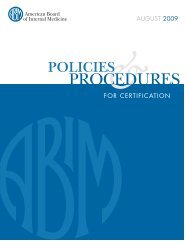The SRA Symposium - College of Medicine
The SRA Symposium - College of Medicine
The SRA Symposium - College of Medicine
You also want an ePaper? Increase the reach of your titles
YUMPU automatically turns print PDFs into web optimized ePapers that Google loves.
Informed Consent: Writing? Readability? Understanding? Deciding?<br />
Mark Hochhauser, Ph.D.<br />
Readability Consultant<br />
3344 Scott Avenue North<br />
Golden Valley, MN 55422<br />
Phone: 763-521-4672<br />
Fax: 763-521-5069<br />
E-mail: MarkH38514@aol.com<br />
Papers<br />
Abstract:<br />
This article analyzes the consent form both from the writer’s perspective (Writing and Readability)<br />
and the subject’s interpretation (Understanding and Deciding). <strong>The</strong> Writer (Part I) suggests consent<br />
form improvements via 1) a plain English Summary and 2) document design recommendations.<br />
Because regulators and IRBs assume that consent form “readability” affects understanding,<br />
Part II (Readability) explains 1) consent form readability, 2) why reading and understanding are<br />
not the same, and 3) the difficulty <strong>of</strong> writing consent forms at a 6th-8th grade reading level. <strong>The</strong><br />
Subject (Part III) 1) summarizes consent form comprehension studies showing that consent forms<br />
written at lower grade levels improve comprehension only slightly, 2) identify flaws in consent<br />
form comprehension research, and 3) describe how to reduce therapeutic misconceptions by contrasting<br />
research and treatment. Part IV (Deciding) points out how brain anatomy affects consent<br />
form understanding, 2) why logic and emotion influence consent decisions, 3) the relationship<br />
between working memory and information overload, 4) how prospective subjects use “heuristics”<br />
to make decisions under uncertainty and 5) how “cognitive illusions” can affect consent form understanding<br />
and the decision making process.<br />
Introduction<br />
<strong>The</strong> Writer: Federal regulations (45 CFR 46) state that:<br />
“<strong>The</strong> information that is given to the subject or the representative shall be in<br />
language understandable to the subject or the representative.”<br />
<strong>The</strong> Nuremburg Code states that:<br />
“<strong>The</strong> person involved…should have sufficient knowledge and comprehension <strong>of</strong><br />
the elements <strong>of</strong> the subject matter involved as to enable him to make an<br />
understanding and enlightened decision.”<br />
<strong>The</strong> World Medical Association Declaration <strong>of</strong> Helsinki states that:<br />
“In any research on human beings, each potential subject must be adequately<br />
informed <strong>of</strong> the aims, methods, anticipated benefits and potential hazards <strong>of</strong> the<br />
study and the discomfort it may entail.”<br />
But implementing those broad recommendations into the consent form process has proved difficult,<br />
if not impossible. Unfortunately, these three documents do not suggest how consent form<br />
writers can produce consent forms in “understandable language” so potential subjects can “be<br />
adequately informed” in order to make “an understanding and enlightened decision.” This writing<br />
problem is compounded by the requirement that consent forms include the FDA’s eight “basic<br />
elements” <strong>of</strong> informed consent, six “when appropriate” elements <strong>of</strong> consent, plus as many as six<br />
to eleven HIPAA privacy topics. Such requirements lead to average (oncology) consent forms <strong>of</strong><br />
2,700 words in eleven pages (Sharp, 2004).<br />
But HIPAA adds even more words and topics to the consent form. Whether HIPAA information<br />
is included as part <strong>of</strong> the consent form or as an addendum to the consent form, it still contributes<br />
to the prospective subject’s cognitive load. Researchers must consider the all 20-25 topics in the<br />
consent process/consent form, because the topic count gives an idea <strong>of</strong> the information overload<br />
2005 <strong>Symposium</strong> Proceedings Book 105

















